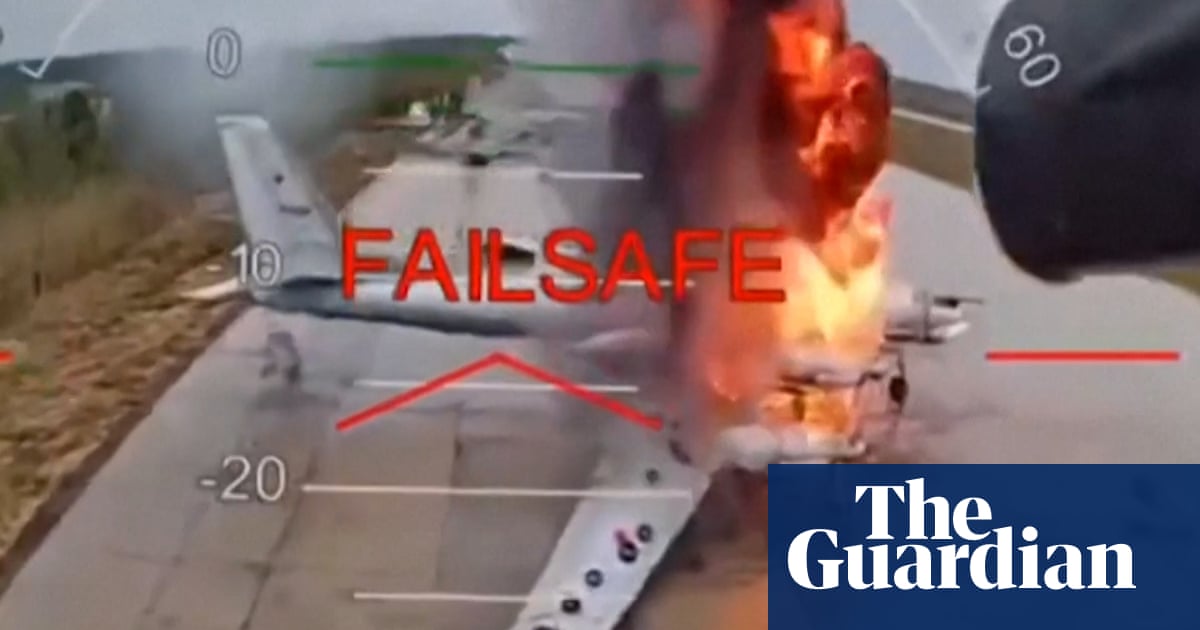Russia will respond to Ukraine’sdaringdrone operation “how and when” it sees fit, the Kremlin has warned, seeming to confirm reports Vladimir Putin had told Donald Trump thatMoscow was obliged to retaliate.
Ukraine has been bracing for retaliation after its SBU security service carried out a surprise drone strike over the weekend, targeting four airbases and damaging up to 20 Russian warplanes deep inside the country, according to US officials.
The Kremlin spokesperson, Dmitry Peskov, asked on Thursday what Moscow’s response would be, said: “How and when our military deems it appropriate.”
Trump said Putin had “strongly” told him thatRussiawould respond to the recent attacks on its airfields, during an unannounced phone call on Wednesday.
The US embassy in Ukraine warned of a continuing risk of “significant airstrikes” and advised its citizens to exercise caution.
Hours after Trump and Putin spoke, Russia launched a series of missiles and drones across Ukraine overnight. At least five people, including a one-year-old boy, his mother and grandmother, were killed when a drone struck a residential building in the northern Ukrainian city of Pryluky.
The child was the grandson of an emergency responder, the Ukrainian president, Volodymyr Zelenskyy, said. “One of the rescuers arrived to respond to the aftermath right at his own home,” Zelenskyy said in a post on Telegram. “It turned out that a Shahed drone hit his house.”
In the southern city of Kherson, a large hole was seen in an administration building after missile attacks by the Russian army.
But Russian officials have suggested that Moscow has yet to respond to Ukraine’s weekend drone attack, which came a day beforetwo bridges collapsed, killing seven people – attacks Moscow blamed on Ukrainian sabotage.
After Ukraine carried out its unorthodox operation using drones smuggled into Russia on trucks, pro-Kremlin war bloggers and prominent commentators posted on Russian media to demand retribution, with some calling for nuclear retaliation.
While Russian officials have previously indicated their willingness to use nuclear weapons in Ukraine, analysts consider the deployment of such weapons on the battlefield highly unlikely at this stage of the war.
Russia’s nuclear doctrine permits the use of nuclear weapons in response to attacks that pose a “critical threat” to the country’s sovereignty.
In a podcast for the independent outletMeduza, Pavel Podvig, a Geneva-based expert on Russian nuclear forces, rejected suggestions that Ukraine’s recent drone strikes could justify such a response. He argued the operation did not threaten Russia’s sovereignty or territorial integrity, nor did it undermine the retaliatory capacity of its strategic nuclear arsenal.
A nuclear strike would also be strongly condemned by China, Russia’s most influential ally, with Xi Jinping previously warning Putin against the use of nuclear weapons in Ukraine.
Instead, as in past responses to Ukrainian military successes, Moscow may launch a wave of deadly ballistic missile strikes – or deploy its experimental Oreshnik missile, which was used at least once last year.
Ukraine has intensified its sabotage operations over the past week, including detonating underwater explosives beneath a key bridge linking Russia to the Crimean peninsula, which Moscow annexed in 2014.
On Wednesday, a visibly angry Putin for the first time reacted to the Ukrainian attacks, accusing Kyiv of “organising terrorist attacks”. “How can we have meetings like this under these conditions? What is there to talk about? Who has negotiations with … terrorists?” he said.
Trump has not publicly commented on the Ukrainian drone operation, but sources who reportedly discussed it with him told Axios hedescribedthe attack as “strong” and “badass” and saw it as a setback to his diplomatic initiative to end the war.
While the drone strikes dealt a tangible blow to Russia’s military capacity and offered a morale boost for Kyiv, the broader picture remains less rosy for Ukraine.
More than three years after launching its invasion, Russia is largely on the offensive, making steady battlefield gains in eastern Ukraine and continuing to pound Ukrainian cities and civilians with drones and missiles.
Putin’s forces have been advancing further into Ukraine’s northern region of Sumy, threatening the regional capital after taking more than 150 sq km of the area in less than two weeks.
With Putin showing no willingness to agree to a lasting ceasefire, Ukrainian officials and the military are preparing for a Russian summer offensive, with Moscow intent on advancing into the Sumy and Kharkiv regions.
